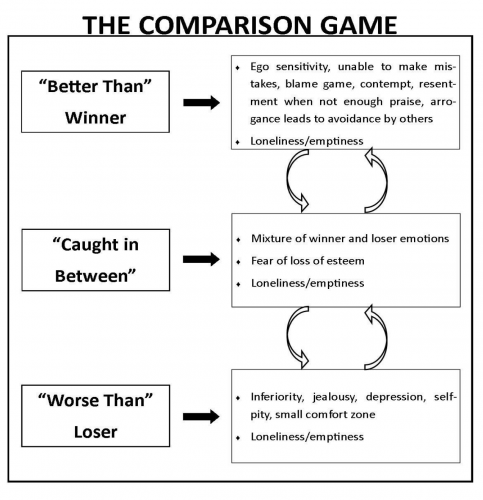The desire to be admired, to be a “winner”, is a natural desire in the search for happiness, but when it becomes our only purpose then it will drive us to absurd limits. As in the case of Shakespeare's Macbeth, who brutally murdered all who stood in his way and eventually drove himself “mad”. Now this is an extreme case, for most of us we desire to merely be a “a cut above the company.” So how do we fulfill our desire to ultimately be loved by others without becoming an egotist?
Fr. Spitzer in his article, Escaping Your Personal Hell, addresses this problem as “getting caught in the comparison game”. One gets caught in the comparison game when "winning" (Level 2) becomes so important that one believes that this is the only real source of our happiness and that it is the only thing that will make our lives worth living. We begin to define ourselves, our self-worth, career choices, friendships, and marriage choice in terms of this all-important objective. This can lead to a host of very negative emotions.
Many people begin to split the world into two parts – winners and losers (people who are above the norm and people who are below it). They tend to classify themselves in one of three ways:
(1) Winners
(2) Losers
(3) Caught in-between
These self-classifications have negative emotional consequences as shown in the chart below. 
Below are Fr. Spitzer’s two sure methods of channeling our desire for admiration into the good of others.
Write Your Own Self-definition
There is something - some difference that only you can make in this world. So start by asking yourself “What can I do for others?”
Write your own self-definition. Challenge yourself, “What it is that will make my life optimally worth living?”
Separate out all the various areas that you can really make a difference in.
- How can you make a difference to your family and your friends in your own unique way by utilizing your time, your talents, and your energy? Find the best way you can make an optimal positive difference in the lives of those around you.
- Then apply the same thinking to your school or your work place – sometimes you are going to try this thing and you might draw a big blank but eventually it will start to work out.
- Continue in the same vein with your Community - join a community center, join a little league, or school board. Look for opportunities. What can I do that will make my community a better place?
- Once you’ve been actively working to make a difference in your immediate surroundings you might even have a chance to influence the society/culture.
If you are a believer, each step you take to make an optimal positive difference you should look at it as an opportunity to grow the kingdom of God. How can I tell people about the Gospel? How might I be able to be a source of light for the world? By doing this you will be adding the maximum possible meaning to life and countering the unhappiness and despair that come with the emotions of the comparison game.
After writing out your self-definition end with the words, “FOR THIS I CAME.”
For instance, Jesus says – “I came that they may have life and have it abundantly.” (Jn 10:10)
As you begin to live out your self-definition the emotions of the comparison game are going to diminish. You will begin to feel a sense of greater self worth from a positive perspective and not just because you want to feel better than others.
Amory Blaine, the protagonist of F. Scott’s Fitzgerald’s novel, This Side of Paradise comes to this realization when he has pursued all the Level 1 and Level 2 desires and is left disillusioned. It’s not until he attends the funeral of a Monsignor that he realizes what his optimal positive difference can be:
“He found something that he wanted, had always wanted and always would want - not to be admired, as he had feared, not be loved as he had made himself believe, but to be necessary to people, to be indispensable.” (New York: Charles Scribner’s Son, 1920, 266)
Look For the Good News in the Other
A great French philosopher Gabriel Marcel once noted that you cannot look for both the good news and the bad news in others simultaneously. If you are looking for the bad news, it eclipses the good news. However, if you are looking for the good news, it puts the bad news into a larger and more positive perspective.
Unfortunately, “looking for the bad news” is our default drive because it arises out our desire for pleasure and to be better than others. If we are trying to gain material and ego-comparative advantage over others, we will not be inclined to look for the good news in others. We will look for the ways in which we are better than they are – screening out everything but the bad news in others.
If we only look for the bad news in the other then we have no empathy for the other, but when we look for the good in others we see the good in ourselves. People will naturally flock to you because you build them up instead of tearing them down as can be seen in the lives of the great saints like St. Francis of Assisi, St. Teresa of Calcutta, etc.
If you ever feel yourself getting stuck in the comparison take a step back and look for the good you can do for yourself and for others. To read more into escaping your own personal hell view Fr. Spitzer’s article, Escaping Your Personal Hell.
